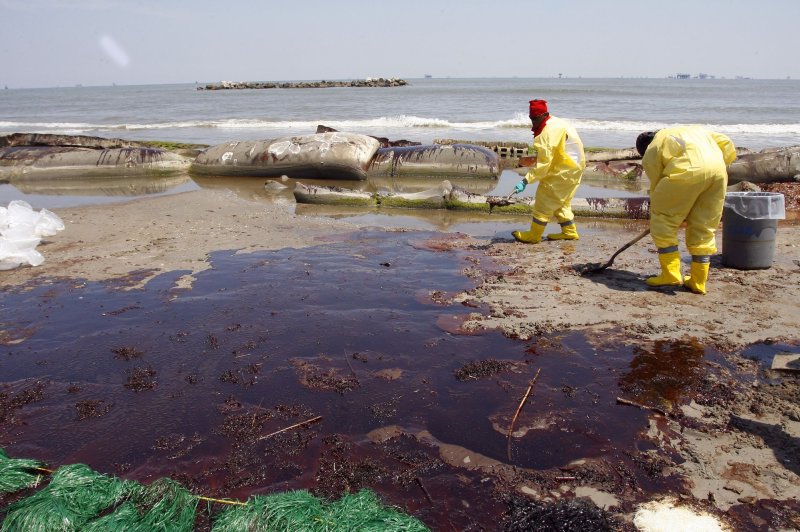BP workers use shovels to clean oil from a beach at Port Fourchon, Louisiana, May 24, 2010. UPI/A.J. Sisco |
License Photo
WASHINGTON, April 8 (UPI) -- Roughly four years after BP's Deepwater Horizon oil rig exploded, spilling 200 million gallons of oil -- the biggest oil spill in U.S. history -- wildlife in the Gulf of Mexico continue to struggle.
According to a new report by the National Wildlife Federation, bottlenose dolphins, sea turtles and other animals continue to die at heightened rates, and many Gulf Coast ecosystems remain slow to recover.
"Four years later, wildlife in the Gulf are still feeling the impacts of the spill," Doug Inkley, senior scientist at NWF, said in a recent press release. "Bottlenose dolphins in oiled areas are still sick and dying and the evidence is stronger than ever that these deaths are connected to the Deepwater Horizon. The science is telling us that this is not over."
The Deepwater Horizon erupted in flames on April 20, 2010, killing 11 men working on the rig and spilling millions of gallons of oil into the Gulf. Although the tourism industry has mostly bounced back, and beaches are clean, fisherman report that catches remain lower than average -- neither the shrimp nor oyster industries are back to full strength.
Now, NWF's new report suggests non-commercial marine animals are faring even worse.
Worst among the study's findings are the continuing effects of the oil spill on dolphins and turtles. Some 500 sea turtles have been found dead every year for the past three years in the affected regions. Last years, dolphins died at three times the normal rate, and scientists have found oil to be affecting dolphins lung capacity, making them sick.
Sperm whales have been found with unusually high levels of DNA-damaging metals -- metals that match the components of the oil spilled by BP.
"Despite what BP would have you believe, the impacts of the disaster are ongoing," said Sara Gonzalez-Rothi, NWF senior policy specialist. "Last year, nearly five million pounds of oiled material from the disaster were removed from Louisiana’s coast. And that’s just what we’ve seen. An unknown amount of oil remains deep in the Gulf."
[National Wildlife Federation]
[National Geographic]
[CNN]















